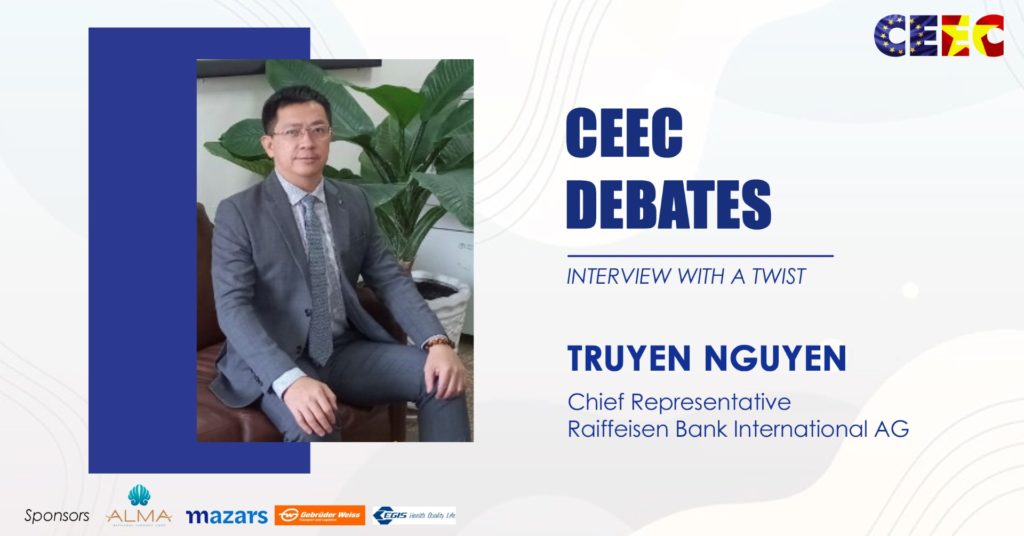Vlad Savin: Raiffeisen is one of the largest banking groups in Central and Eastern Europe with an established brand exposure. What is Raiffeisen’s history here in Vietnam and most importantly the goals you are seeking to achieve in the market?
Truyen Nguyen: Raiffeisen Bank International (RBI) is Austria’s second-largest bank and the central institute of the country’s largest banking group. We consider both Austria and Central and Eastern Europe (CEE) our home market. Our head office is in Vienna, and we have subsidiary banks in 13 CEE countries including Slovakia, Ukraine, the Czech Republic, Russia or Romania, to name just a few. We have been present in Vietnam for over 23 years, as our office was established in 1997.
At the initial stage, when we opened the representative office in Vietnam, we have noticed the collaboration opportunities and alignment between Vietnam and CEE, thus we decided to explore in depth the potential of these markets.
We have a strong relationship with the Ministry of Finance in Vietnam, which is one of the many institutional clients we support here in Vietnam with credit facility agreements.
We are proud to support and finance a multitude of projects in Vietnam, including some of the most important focus areas for the country such as Healthcare, Infrastructure, Environment and Education. Most of the country’s largest financial institutions are our customers, and we offer a wide variety of banking products such as trade finance, cash management, money market services and others.
We represent RBI in Vietnam but also in the whole Indochina region, and we work with European exporters to enable them to reach these markets by providing various financial schemes and instruments.
Vlad Savin: Let’s talk about financial inclusion. A World Bank report from 2019 states that approximatily 69% of the population of Vietnam is unbanked, essentially they are not part of the financial system. How would you tackle this challenge and opportunity in the same time?
Truyen Nguyen: Indeed, Vietnam’s 98 million population represents an attractive opportunity for the financial institutions in the country, however there are certain issues which need to be considered.
First of all, the banks’ networks and their reach in the provinces is important. At the moment, AgriBank has the largest network in Vietnam and can provide financial services in remote areas, while other banks lag behind in this respect.
Secondly, most of the banks in Vietnam focus on large customers such as state-owned enterprises, multinationals, big corporations, and on offering lending products. However, in the past few years we have seen a mindset transformation regarding retail banking services. Some banks that had less than 30% of their business coming from retail services now seek to grow their exposure to 50% and more. And in order to leverage this opportunity to reach the unbanked population, banks are developing new and improved products to attract and convert these customers such as e-banking, digital wallets or internet banking.
In my opinion, Vietnamese and international banks alike should focus more on retail banking opportunities, as there is a significant potential in the market for sustained growth in the future. However, I must add, RBI will not tap that market as we are exclusively focusing on corporate and institutional business outside our home market CEE.
Vlad Savin: The fintech sector is growing exponentially. Vietnam is seen as one of the fastest growing markets for fintech business covering payments, lending, e-commerce, e-wallets, digital bank accounts, entire ecosystems focused on fast, secure and cheap money transactions, digital banks, and the list goes on. How do you see the challenge of competing with the fintech industry?
Truyen Nguyen: I think it is very challenging for the traditional banking sector to compete with the financial technology entities. I am certain that the leaders of most of Vietnamese banks we work with are aware of this major shift in the financial service industry and are seeking ways to invest more and more resources in fintech projects, especially in digital banking and e-banking.
The challenges are represented by the availability of the technology systems and the skill set required to boost the transformation of the banking systems. Non-banking competitors have already taken a lead and established themselves in this digital banking niche, and their agility, flexibility and resources make them a real threat to the market share of the traditional banking players.
Vlad Savin: Right, and sometimes traditional banks end up collaborating with non-banking fintech entities to achieve a common goal and provide more value to the consumers. I’m sure you are familiar with the blockchain technology growth in the last decade. In 2020, under a pilot project, RBI partnered with Polish-British fintech firm Billon to use its distributed ledger technology for the e-money solution. How do you see the future of e-money in Vietnam and what is your view of using digital transformation to enable blockchain solutions in Vietnam?
Truyen Nguyen: I’m glad to see you are already familiar with our program in Poland and you are right: Raiffeisen has a consistent reputation for digital banking in both Austria and Central and Eastern Europe. For example, in Austria 43% of customers use e-banking, and in Russia, for example, over 60% of customers use our digital offering. Also, at our head-office in Vienna we have our Innovation Hub with the purpose to leverage and develop creative ideas to further develop new products and services to our customers.
In Vietnam, all commercial banks are aware and have on open mind regarding blockchain technology and e-money, and where we see the real change coming from is the State Bank of Vietnam, who is taking time to evaluate, test, research and carefully understand the potential and impact of these technologies in the Vietnamese market, before they can draft and implement safe and secure policies for e-money transactions.
Vlad Savin: Innovation in banking, does it still exist? What is your view on the ways the banking system can use innovation to stay ahead?
Truyen Nguyen: Traditional banking is here to stay, and our goal is to consistently develop our processes and framework to better serve our customers. Yes, innovation is a critical part of the banking sector, and we need to align our technology with the changing demands of our customers and their financial habits and way of life. The combination of traditional banking and fintech is proven to be a major powerhouse in the financial industry ecosystem, with the potential to reach and service the best of both worlds.
Vlad Savin: If you were to hold a roundtable discussion tomorrow at your office bringing together government representatives and thought leaders from the public and private sectors, what would be the number one item you would place on the agenda?
Truyen Nguyen: There are many changes in our industry, and these will continue to impact our development in ways which we may not predict with precision at the moment. I would emphasize the need for inclusivity and collaboration in the financial services industry, local authorities, public and private sector alike, and I would appeal for maintaining an open mind so we can adapt to the demands of our customers. The most important element we should focus on is the demand of the customers: what do they need, what do they want and how can we deliver?
Vlad Savin: How confident are you in the future of Vietnam on a scale of 1 to 10? And why?
Truyen Nguyen: I would put it around seven most probably. Currently and in recent times as well, the leaders of the country have been open-minded, with a broad experience in international relations, focused on addressing corruption and on sustaining the growth of the economy. I am confident and proud that the government was efficient in addressing the Covid pandemic and I strongly believe that the development strategy of the country is extremely consistent. Moody’s and Fitch recently upgraded Vietnam’s country financial stability rating from negative to positive and stable to positive, respectively, proving once more that the international community is aware of our efforts and acknowledges our considerable achievements. Vietnam also has a strong policy for supporting Foreign Direct Investment, which accounts for more than 70% of exports and is seen as a cornerstone strategic initiative, thus I am very optimistic in the economic development of this country.

